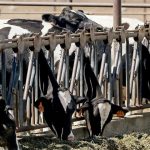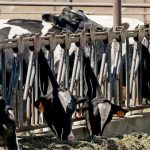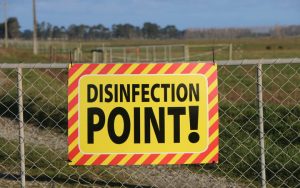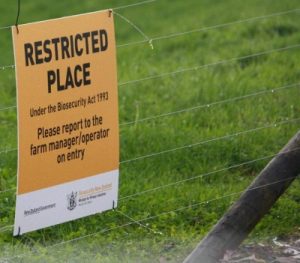
Kerry Dwyer writes about the frustration he and many other farmers experienced with the Ministry for Primary Industries as it struggled to deal with Mycoplasma bovis. He’s still wanting answers.
On August 28, 2017 MPI walked in our door chasing Mycoplasma bovis (M bovis). Since then we’ve dealt with our own problem, alongside a lot of other farmers affected to a greater or lesser extent by the response to the disease.
THE GOOD
My wife Rosie and I depopulated all our cattle well before any other farms, because it was the best way to handle the animal welfare and financial brick wall that was ahead of us. We were aided in doing this by some very good people from the Ministry for Primary Industries (MPI). At that stage no plans were functioning so we had to push to get cattle out, and MPI’s assistance was crucial in achieving that.
AsureQuality was given the hands-on tasks early in the response, and while we didn’t have much to do with their people, what dealings we did have were frustrating and time consuming.
Note that the Biosecurity Act states that compensation doesn’t have to be paid for “diseased organisms”, which was a situation faced by Foveaux Strait oyster farmers in 2016, and also by some North Island plant nurseries when myrtle rust appeared in 2017.
THE BAD
When the full primary industry response got into action in May 2018 it appeared the full budget to eliminate M bovis was $886 million; I now read it to be $870m. That was to be funded 68% by government and 32% by industry, i.e. Beef + Lamb and DairyNZ. Part of the deal was that affected businesses would be compensated for cattle and some costs incurred.
The big question is where did the money go? To date there have been 2870 claims and just under $240m has been paid as compensation to affected farmers. That is an average of just on $84,000 a claim, and note that the most affected farms will have put in multiple claims, largely because the time frame to get from initial to final compensation may be as long as three years.
It appears that all the $870m or $886m has been spent. This means $630m was spent on the response effort, being all the MPI and AsureQuality people and time, along with whatever else. I commented to Minister of Agriculture Damien O’Connor at one stage that the M bovis response was creating more jobs than the government’s Provincial Growth Fund.
While there have been various reports written on the M bovis response that have dealt largely with the effects on farmers and cattle, I question the audit process and the justification of the $630m spend.
I had a couple of AsureQuality people in for coffee in late 2017 and asked one of them how long he’d been on the project. The response was that he came from the North Island for a two-week shift then had similar time at home, because it was a “very stressful job”. Yeah right.
One farmer I dealt with had more than 100 water troughs to be cleaned, so five people arrived with a vehicle each, a smoko portacom and toilets. On their first day they cleaned five troughs and managed to break three ball-cocks. The farmer was going to watch them but decided it would be better to empty all the troughs himself, to get rid of them earlier than the possible month or more it would have taken at that rate.
MPI might be able to justify spending $630m in their world of bureaucracy but we farmers saw a huge waste.
Transparency and bureaucracy are not natural companions, and bureaucrats have a tendency to be very defensive when questioned, let alone criticised. To get most information from MPI you have to do an Official Information Act request (OIA), which they basically have to respond to within 20 working days. My first series of OIA requests related to the MPI response plan for M bovis, or similar. It appeared there had been no structured plan available in 2017. What was the director of MPI doing in the years prior to that? Bugger all it seems.
My second series of OIA requests related to how compensation was assessed: i.e. what were the criteria used by their people to assess whether it should be paid or not? Again it took a series of OIA requests to get nowhere. Either they didn’t have clear assessment guidelines or wouldn’t provide them.
The third series of OIA requests I put in related to their complaints procedure. A written complaints process is basic twenty-first century governance: if you receive a complaint it outlines the process to deal with it in a fair, transparent and timely manner. MPI stuck to the pattern of asking for extensions to my OIA requests, and then basically said they didn’t have a complaints procedure. If they receive a complaint they hope you just go away when they don’t answer.
AND THE UGLY
My first conversation with an MPI compensation person was on August 30, 2017, who said their brief was to minimise the cost to the taxpayer. My reply was that we just wanted a fair deal. That chap did subsequently apologise to me for taking that stance, but it has been the culture we have consistently struck when dealing with compensation.
Rosie and I visited MPI compensation staff in Wellington on June 1, 2018, to push the line that as citizens, we deserved communication, consultation and choice. It fell on deaf ears, or the ears changed in the constant shuffling of MPI staff.
The MPI brand is probably rated in primary industry at the same level as the Census is with Maori, maybe worse. I have had more apologies from MPI compensation than hot dinners. We just wanted them to do their job in a fair and timely manner. The audit process to achieve a compensation payment has been thorough, which seems to be lacking with the rest of the M bovis response spend.
We had all our cattle killed by a local processor, to go into the human food chain. Subsequent to that MPI realised that small cattle had a net processing cost and were better disposed of by other methods, which they called pet food. I don’t have any opinion against that, but I still cannot stomach the mis-truth that slaughtering cattle and disposing of them in landfills can then be called “processing for pet food”.
The owners of those cattle deserved to be told the truth, not blatantly and constantly lied to.
Which raises the question about what other parts of the M bovis response have been hidden under the carpet?
I attended a few MPI-arranged meetings concerning M bovis, most of which were time that I will never get back. At one I made the point that you can roll a turd in glitter, but it is still a turd.
Kerry Dwyer is a North Otago farm consultant and farmer.

























